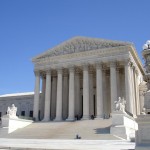This is part 4 of a 5-part article. Read Part 1 Here Read Part 2 Here Read Part 3 Here But there is hope. Some of the institutional safeguards compromised away, such as federalism and the Tenth Amendment, are making a comeback in modern Supreme Court jurisprudence. Supreme Court decisions over the last decade have again invoked the … [Read more...]
Changing Lanes, Part 3: The Historical, Jurisprudential Shift To Individualism
This is part 3 of a 5-part article. Read Part 1 Here Read Part 2 Here Mediating entities are the glue that holds society together. For Tocqueville, the “intellectual and moral associations” provided by these mediating entities were so important that “nothing . . . more deserve[d] attention.” How then did we get to the point in modern … [Read more...]
Changing Lanes, Part 2: Mediating Entities
This is part 2 of a 5-part article. Read Part 1 Here So what are "mediating entities" and why are they essential to a free society? The word mediate comes from the Latin mediare, which means “to be in the middle.” A mediator is one who stands in the middle of a dispute to help the parties find a common-ground resolution to the … [Read more...]
Changing Lanes: Circumventing Individualism Through Jurisprudential Policy, Part 1
This is part 1 of a 5-part article. The National Platform of the Libertarian Party defends the view that “all individuals have the right to exercise sole dominion over their own lives, and have the right to live in whatever manner they choose, so long as they do not forcibly interfere with the equal right of others to live in whatever manner … [Read more...]
The Anti-Federalists, Entrepreneurship, & the Future of Freedom, Part 6: Solutions
This is part 6 of a 6-part article. Click Here to Download a Printable Version of This Article Read Part 1 Here Read Part 2 Here Read Part 3 Here Read Part 4 Here Read Part 5 Here Solutions Old and New The anti-Federalist solutions for these problems may well have helped. They proposed that the people amend the Constitution, specifically in … [Read more...]
The Anti-Federalists, Entrepreneurship, & the Future of Freedom, Part 4: Justice Lost
This is part 4 of a 6-part article. Read Part 1 Here Read Part 2 Here Read Part 3 Here Anti-Federalist Prediction #5: Justice Will Be Lost as Government Grows Prediction: Governments will become so big and impersonal that even juries won’t know or care about the accused; enforcing the rules will be more important than true justice. … [Read more...]
The Anti-Federalists, Entrepreneurship, & the Future of Freedom, Part 3: States & Courts
This is part 3 of a 6-part article. Read Part 1 Here Read Part 2 Here Anti-Federalist Prediction #3: Power Will Flow Away From the States Prediction: Power will flow consistently away from the states and increase the scope, size, and power of the federal government. Only major crisis, where the federal government falls, will ever send … [Read more...]
The Anti-Federalists, Entrepreneurship, & the Future of Freedom, Part 2: Executive Branch & National Debt
This is part 2 of a 6-part article. Read Part 1 Here Anti-Federalist Prediction #1: The Executive Branch Will Increase Influence Over National Budget Prediction: The Executive Branch will increase its say over the national budget and then drastically increase debt, run harmful deficits, engage in unconstitutional military actions, and … [Read more...]
The Anti-Federalists, Entrepreneurship, & the Future of Freedom, Part 1: Predictions
This is part 1 of a 6 -part article. Subsequent segments will be published daily. Read Part 2 Here Read Part 3 Here Read Part 4 Here Like Gladstone, I believe the U.S. Constitution to be “the greatest work ever struck off by the mind and purpose of man.” Even though it had its flaws—especially slavery—it actually provided for the fixing … [Read more...]
State-Sanctioned Torture: A Clear Road to Tyranny
Finding the correct solution to a problem is often not so much a matter of stating an answer as it is a matter of asking the right questions. On the issue of state-sanctioned torture, the real question isn’t whether waterboarding or other enhanced interrogation techniques constitute torture; it’s whether the state should be allowed to exercise … [Read more...]














